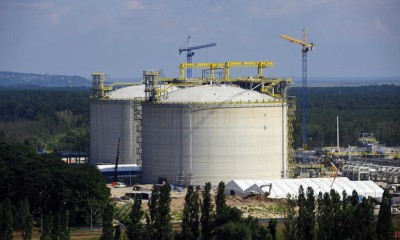Poland to cap gas imports from single source at 70% from April
WARSAW (Reuters) -- Poland plans to cap gas imports from a single source at 70% of overall supplies from April, and reduce that to a third by 2023 as it seeks to cut dependence on Russia and comply with EU law, the energy ministry said.
 |
| Photo Courtesy of Reuters. |
The ministry said the existing law on gas import diversification was introduced before Poland entered the European Union and is incompatible with the bloc's regulations. For example, gas received from other EU states can no longer be treated as imports.
The current regulation assumed that the cap on imports from a single source would be gradually reduced from 88% in 2001-2002 to 49% in 2019-2020, but it did not define the word "imports" and could prevent Poland from using the full capacity at its newly built LNG terminal in Swinoujscie by the Baltic Sea, the ministry said.
In its new proposal, the energy ministry wants to exclude from the regulations imports via the LNG terminal and so-called reverse gas flows from Germany back into Poland.
"We expect the document will enter into force at the start of April," a ministry spokesman said.
Poland consumes around 15-16 billion cubic metres of gas annually. State-run PGNiG, which is dominant on the local market, imports most of the gas it sells from Russia's Gazprom.
But the ruling Law and Justice party is determined to reduce reliance on Russian gas, and a government official said last year that PGNiG will not extend the long-term gas supply deal with Gazprom when the arrangement expires in 2022.
The diversification plan includes replacing gas imports from Russia with LNG and potential deliveries from Norway via a planned pipeline through Denmark and the Baltic Sea.
Reporting by Agnieszka Barteczko; Editing by Dale Hudson

- RWE strengthens partnerships with ADNOC and Masdar to enhance energy security in Germany and Europe
- TotalEnergies and Mozambique announce the full restart of the $20-B Mozambique LNG project
- Five energy market trends to track in 2026, the year of the glut
- Venture Global wins LNG arbitration case brought by Spain's Repsol
- Trinity Gas Storage reaches FID on Phase II expansion



Comments